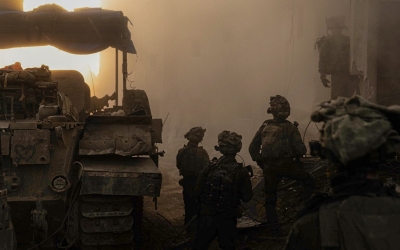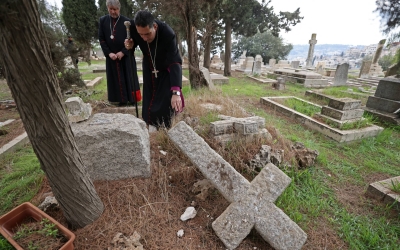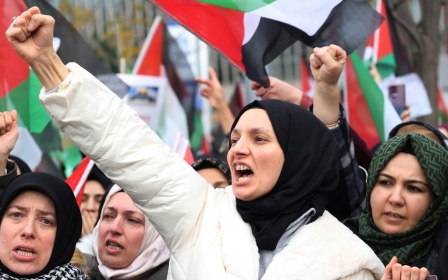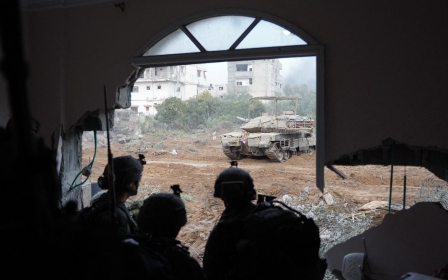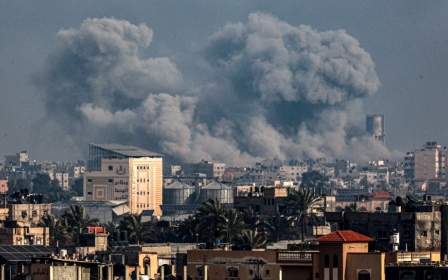War on Gaza: Palestinians seeking refuge at Khan Younis hospital say there's nowhere to go
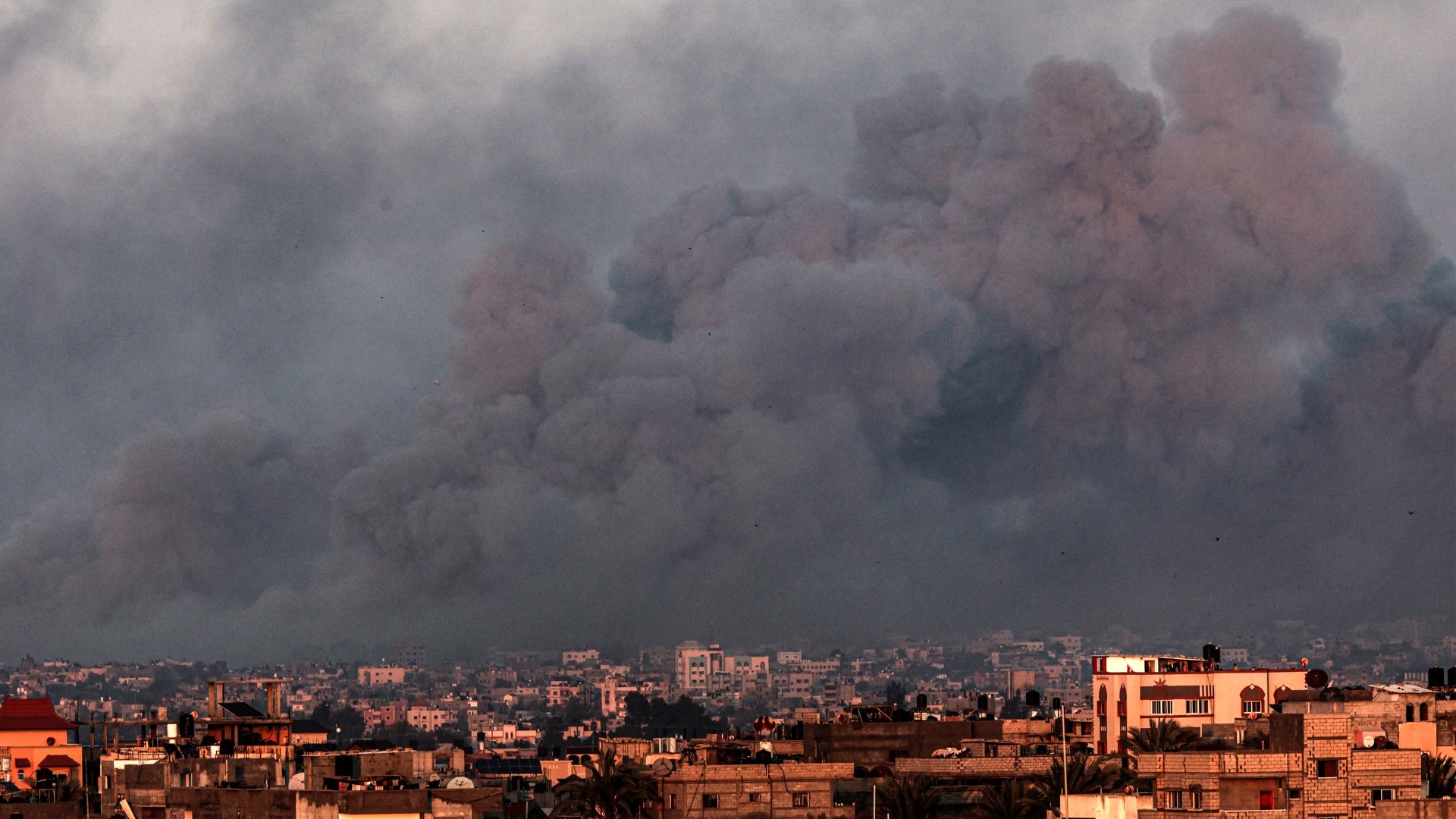
Terrified Palestinians are struggling to find safe hiding places in southern Gaza's main city of Khan Younis, after Israeli forces targeted areas near the biggest functioning hospital sparking fears it could be forced to close.
Residents, including local journalists and medical staff, told Middle East Eye that a convoy of Israeli tanks advanced on the southernmost area of Khan Younis overnight Thursday, forcing hundreds of civilians to seek shelter at the Nasser Medical Complex.
A journalist, who requested anonymity due to fears of retaliatory attacks by Israel, said Israeli forces stationed at the nearby al-Nasmawi cemetery could be seen "indiscriminately" firing shells at residential buildings near the medical facility.
"While some people attempted to escape amid the massive bombardment, most were trapped in their homes, afraid to leave due to indiscriminate bombing and direct targeting of civilians of all ages," the journalist said.
"No one was spared."
New MEE newsletter: Jerusalem Dispatch
Sign up to get the latest insights and analysis on Israel-Palestine, alongside Turkey Unpacked and other MEE newsletters
According to officials from the Palestinian health ministry, at least 77 people have been killed across the embattled territory since midnight. Several people are known to have been killed near the Nasser hospital, but an exact figure remains unclear.
Palestinians fear the attacks around the Nasser hospital could be a prelude to a wider assault on the facility, similar to the targeting of al-Shifa hospital to the north last year.
'After witnessing the atrocities at al-Shifa and al-Ahli hospitals, I was really scared the same would happen to us'
- Muhammad Ziyad, displaced to Nasser hospital
According to the United Nations’ humanitarian office, around 7,000 Palestinians are believed to be sheltering on the grounds of the Nasser hospital.
Al-Shifa - previously the largest medical complex in Gaza - has been turned into nothing more than a first aid station due to months of Israeli attacks.
MEE found that within the facility, most services had been shuttered, including surgery and X-ray departments, as well as operation rooms. Only a few volunteers remain to provide basic medical care, after many specialists and nurses were either arrested or forced to flee.
"After witnessing the atrocities at al-Shifa and al-Ahli hospitals, I was really scared the same would happen to us," Muhammad Ziyad, who has been sheltering at the Nasser hospital for over a month with his family, told MEE.
"The fear was devastating. No one could sleep all night. I felt helpless, my children and my wife were crying in front of me and they were afraid. I was unable to protect them.
"I decided to leave the hospital but I didn't know where to go. I have been at the hospital for the past few days, sleeping in the corridors and feeling humiliated as I ask for aid, but I was hoping for a sense of safety for my family, but it is clear that there is no safety anywhere in Gaza, whether in the north or south or between them."
Two-thirds of Gaza's hospitals have been forced to close and those still open offer limited maternity, trauma, and emergency care services. Losing Nasser would further curtail the limited trauma care still available in the southern Gaza Strip.
Another resident of Khan Younis told MEE that at least seven displaced Palestinians people were killed while sheltering inside the Tariq Bin Ziyad School, which is situated close to the Nasmawi cemetery where Israeli forces are stationed.
The resident said that the area where the school is based, known as Block 107 according to an Israeli initiative dividing Gaza into numbered blocks, was previously declared a "safe zone".
On 1 December, the Israeli army released a map of Gaza indicating areas that it would imminently strike, and areas to which civilians should flee.
Since then, areas previously designated as "safe zones" across Khan Younis and Rafah have been repeatedly targeted by air strikes and Israeli shelling.
The constant bombing of the south has made led many of the 1.2 million displaced Palestinians in the south to wonder if they are any safer there, or whether it would be better to take their chances at home.
Israel exhumes bodies at Gaza cemetery
For more than 100 days, heavy Israeli bombardment and a ground invasion have reduced vast areas of Gaza to a ruined wasteland.
Much of the north has been completely flattened, with more than 24,500 Palestinians killed across the enclave, with women and children accounting for more than two-thirds of them.
Some Palestinians have reported trying to flee to Mawasi, a strip of agricultural land on the coast of Gaza declared a "safe zone", but Israeli sniper fire and shelling has prevented them from reaching their destination.
Several eyewitnesses told MEE that early on Thursday, the Israeli army repositioned itself in the neighbourhoods of Batn al-Sameen and Qizan al-Najjar, after leaving Khair al-Namsawi and the Namsawi cemetery.
The eyewitnesses said the repositioning was a terrifying experience with deafening mortar shells bursting unceasingly thoughout the night.
Later on Thursday, as they attempted to return to makeshift shelters, several Palestinians said the Israeli army had bulldozed and desecrated graves at the Nasmawi cemetery.
One resident told MEE that the bodies of at least seven Palestinian bodies "were stolen by the Israeli army".
"We found traces of rubber gloves that Israeli soldiers used in other raids on cemeteries in Gaza," the resident said.
Reports of the Israeli army taking corpses from gravesites have been circulating on social media for days, with Palestinians in Gaza and the West Bank expressing outrage at the practice.
In response to questions, the Israeli army confirmed digging up Palestinian graves, and said rescuing Israeli captives and finding and returning their bodies is one of its key missions in Gaza.
Israel has said that more than 250 people were taken captive during the 7 October attack and believes 136 are still in Gaza – 105 of them alive and 27 dead.
So far, there has been no evidence to suggest that the bodies exhumed from the Khan Younis cemetery are Israeli.
According to international law, an intentional attack on a cemetery could amount to a war crime, except under very limited circumstances relating to that site becoming a military objective.
Middle East Eye delivers independent and unrivalled coverage and analysis of the Middle East, North Africa and beyond. To learn more about republishing this content and the associated fees, please fill out this form. More about MEE can be found here.


